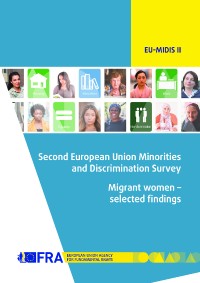https://tandis.odihr.pl/handle/20.500.12389/22583
| DC Field | Value | |
|---|---|---|
| Country Coverage | Austria | |
| Country Coverage | Belgium | |
| Country Coverage | Cyprus | |
| Country Coverage | Denmark | |
| Country Coverage | Finland | |
| Country Coverage | France | |
| Country Coverage | Germany | |
| Country Coverage | Greece | |
| Country Coverage | Ireland | |
| Country Coverage | Italy | |
| Country Coverage | Luxembourg | |
| Country Coverage | Malta | |
| Country Coverage | Netherlands | |
| Country Coverage | Poland | |
| Country Coverage | Portugal | |
| Country Coverage | Slovenia | |
| Country Coverage | Sweden | |
| Country Coverage | United Kingdom | |
| Accessioned Date | 2020-01-16T11:15:18Z | |
| Availability Date | 2020-01-16T11:15:18Z | |
| Issue Date | 2019-09 | |
| ISBN | 9789294746221 | |
| ISBN | 978-92-9474-621-4 | |
| URI | http://hdl.handle.net/20.500.12389/22583 | |
| Abstract | "FRA’s second EU Minorities and Discrimination survey (EU-MIDIS II) collected information from over 25,000 respondents with different ethnic minority and immigrant backgrounds across all 28 EU Member States. The main findings from the survey, published in 2017, pointed to a number of differences in the way women and men with immigrant backgrounds across the European Union (EU) experience how their rights are respected. This report summarises some of the most relevant survey findings in this regard, which show the need for targeted, gender-sensitive measures that promote the integration of – specifically – women who are immigrants or descendants of immigrants. // Access interactive country results using our survey data explorer >> This report examines the results of EU-MIDIS II in relation to immigrants and descendants of immigrants in 19 EU Member States (Austria, Belgium, Cyprus, Denmark, Germany, Greece, Finland, France, Ireland, Italy, Luxembourg, Malta, Netherlands, Poland, Portugal, Slovenia, Spain, Sweden and the United Kingdom). Among the 16,149 EU-MIDIS II respondents with an immigrant background, half are women (50 %); however, there are substantial variations across countries and the survey’s target groups. The analysis examines the situation of the women surveyed as compared to that of men, as well as compared with the situation of women from the general population, where feasible. This evidence is useful for European institutions – in particular the Commission, which promotes more gender sensitive migrant integration policies through its ongoing dialogue with Member States, especially concerning actions co-financed through EU funds. The data, disaggregated by gender and by target group, are, however, particularly useful for Member States, as they can assist them in designing gender sensitive measures targeting the different needs of women of diverse immigrant origins living in the EU. The report builds on earlier publications based on EUMIDIS II survey data and examines the following areas in a series of chapters: - Legal status and main reason for migrating; - Education; - Employment; - Discrimination, harassment, violence and rights awareness; - Values and attitudes." | |
| Format | ||
| Language | en | |
| Subject Keywords | intolerance | |
| Subject Keywords | hate crime | |
| Subject Keywords | migration | |
| Subject Keywords | migrants | |
| Subject Keywords | discrimination | |
| Subject Keywords | minority rights | |
| Subject Keywords | women's rights | |
| Subject Keywords | FRA | |
| Subject Keywords | women | |
| Title | Second European Union Minorities and Discrimination Survey : Migrant women - selected findings | |
| Material Type | thematic report | |
| Corporate Authors | European Union Agency for Fundamental Rights (FRA) | |
| Key Issues | Hate crime | |
| Document Number | doi:10.2811/416766 | |
| URL display | https://fra.europa.eu/en/publication/2019/eumidis-ii-migrant-women | |
| Physical Description | 64 p. | |
| URL more information | https://fra.europa.eu/en/publications-and-resources/data-and-maps/survey-data-explorer-second-eu-minorities-discrimination-survey?locale=EN&dataSource=EUMIDIS&media=png&width=740&topic=5.+Education+and+employment&question=hw_neet1&subset=gender&country=EU27&superSubset=03--North-Africa,05--Recent-immigrants,06--Roma&plot=inCountry&M2V=inCountry | |
| See Also | anti-discrimination | |
| Fulltext | With Fulltext | |
| Fulltext Grant | open | |
| Related Country | OSCE region | |
| Related Country | UN region | |
| Related Country | CoE region | |
| Related Country | EU region (pre-2021) | |
| Related Country | EU region (post-2020) | |
| Related Country | OSCE region | |
| Related Country | UN region | |
| Related Country | EU region (pre-2021) | |
| Related Country | CoE region | |
| Related Country | EU region (post-2020) | |
| Related Country | OSCE region | |
| Related Country | UN region | |
| Related Country | EU region (pre-2021) | |
| Related Country | CoE region | |
| Related Country | EU region (post-2020) | |
| Related Country | OSCE region | |
| Related Country | UN region | |
| Related Country | EU region (pre-2021) | |
| Related Country | CoE region | |
| Related Country | EU region (post-2020) | |
| Related Country | OSCE region | |
| Related Country | UN region | |
| Related Country | EU region (pre-2021) | |
| Related Country | CoE region | |
| Related Country | EU region (post-2020) | |
| Related Country | OSCE region | |
| Related Country | UN region | |
| Related Country | EU region (pre-2021) | |
| Related Country | CoE region | |
| Related Country | EU region (post-2020) | |
| Related Country | OSCE region | |
| Related Country | UN region | |
| Related Country | EU region (pre-2021) | |
| Related Country | CoE region | |
| Related Country | EU region (post-2020) | |
| Related Country | OSCE region | |
| Related Country | UN region | |
| Related Country | EU region (pre-2021) | |
| Related Country | CoE region | |
| Related Country | EU region (post-2020) | |
| Related Country | OSCE region | |
| Related Country | UN region | |
| Related Country | EU region (pre-2021) | |
| Related Country | CoE region | |
| Related Country | EU region (post-2020) | |
| Related Country | OSCE region | |
| Related Country | UN region | |
| Related Country | EU region (pre-2021) | |
| Related Country | CoE region | |
| Related Country | EU region (post-2020) | |
| Related Country | OSCE region | |
| Related Country | UN region | |
| Related Country | EU region (pre-2021) | |
| Related Country | CoE region | |
| Related Country | EU region (post-2020) | |
| Related Country | OSCE region | |
| Related Country | UN region | |
| Related Country | EU region (pre-2021) | |
| Related Country | CoE region | |
| Related Country | EU region (post-2020) | |
| Related Country | OSCE region | |
| Related Country | UN region | |
| Related Country | EU region (pre-2021) | |
| Related Country | CoE region | |
| Related Country | EU region (post-2020) | |
| Related Country | OSCE region | |
| Related Country | UN region | |
| Related Country | EU region (pre-2021) | |
| Related Country | CoE region | |
| Related Country | EU region (post-2020) | |
| Related Country | OSCE region | |
| Related Country | UN region | |
| Related Country | EU region (pre-2021) | |
| Related Country | CoE region | |
| Related Country | EU region (post-2020) | |
| Related Country | OSCE region | |
| Related Country | UN region | |
| Related Country | EU region (pre-2021) | |
| Related Country | CoE region | |
| Related Country | EU region (post-2020) | |
| Related Country | OSCE region | |
| Related Country | UN region | |
| Related Country | EU region (pre-2021) | |
| Related Country | CoE region | |
| Related Country | EU region (post-2020) | |
| Related Country | OSCE region | |
| Related Country | UN region | |
| Related Country | EU region (pre-2021) | |
| Related Country | CoE region | |
| Appears in Collections: | Resources on hate crime Documents Resources on countering intolerance against Muslims | |
Files in This Item:
| File | Description | Size | Format | |
|---|---|---|---|---|
| 22583_EN.pdf | English | 1.46 MB | Adobe PDF |  |

